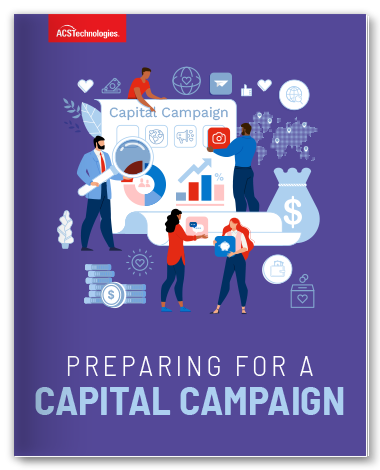Creating an Effective Capital Campaign – Part 4
There are times we ask our church members to step up and help us fund a major project. Like a capital campaign to fund a building, a new ministry, new equipment, or retire old debt.
In this blog series, we’ve been walking through how churches can best plan and execute campaigns that will be successful. We’ll close out this series with how to best acknowledge your campaign donors. Here are three ideas for doing that in an impactful way.
1. Continue to use your campaign branding.
Campaign donors need separate acknowledgments apart from what we send to our regular givers and tithers to our annual operating funds. Most campaigns use a special logo, graphic or tagline, such as “Transforming Lives” or “Building Futures,” in their materials. Use the campaign logo, theme and branding in donor acknowledgments – in letters, other thank yous, thank you gifts – whatever we do over the next three years to thank givers. Donors need to instantly connect that branding to the impact of their gift to the campaign project.
2. Donor thank you gatherings.
It’s important to gather campaign donors at least once a year, especially if it’s a three-year campaign. We can use that time to celebrate with them and thank them for their generosity. Budget some funds as part of the campaign expenses to thank donors in this way each year and make that a special experience. Creative thank you events can feature updates on the project progress, video and allow donors to share their own stories of impact. Churches want this core group of significant funders to feel appreciated and excited about the hands-on role they are playing as contributors to this project.
We know in our work across the country that donors of all levels seek a solid experience. They are most fulfilled in knowing their money has a direct impact on the causes they care about. Keep this in mind as your campaign planning team or board designs some donor thank you events or experiences along the journey of the campaign.
3. Celebrate, celebrate, celebrate.
Once you’ve hit a campaign goal, it’s important to keep the energy high. Celebrate the impact of the campaign as often as you can. While you can’t let the campaign take over the church. It’s also important not to let the visibility fall by the wayside just because the funding is committed. People are still making gifts over the next three years. The communications and updates become critical to ensuring they remain excited and committed to the project. The congregation will churn some during the life of the campaign, and you’ll want your new members to get excited about the project as well.
Conclusion
Depending on your project, you can show progress in lots of creative ways. From time-lapsed cameras on building projects to ongoing testimonials for ministry expansions. Honor the impact your donors have by continuing to celebrate your mission and how the campaign project advances that.
Campaigns can be a unique way for church donors to see firsthand how their funds are working for the church. Donors can often see in these projects how they’ve directly helped their congregation do something special. And how their generosity has advanced the kingdom work of the church.
For more information on consulting for Capital Campaigns, visit ACST’s Consulting pages.
PREPARING FOR A CAPITAL CAMPAIGN
Capital campaigns fail. Avoid the common mistakes and ensure your church’s campaign success by preparing adequately.
This article provides the phases and tools you’ll need to fully prepare your church staff, key volunteers, and donors for all a campaign entails.
Discover the key steps you’ll need to undertake to ensure your church is well-positioned to launch a campaign that will meet its goal.
Tim Smith has over 30 years of experience in Church, Non-Profit Administration, Management, and Fund Development. Serving as an Executive Pastor and Chief Development Officer in growing Churches and Non-Profit Organizations has provided a wide range of expertise and resources. Tim serves as Founder and CEO for Non-Profit DNA. A boutique firm committed to helping nonprofits and churches build their capacity through fundraising, leadership, team building, staff recruiting, and coaching.





